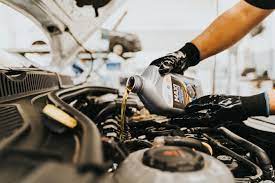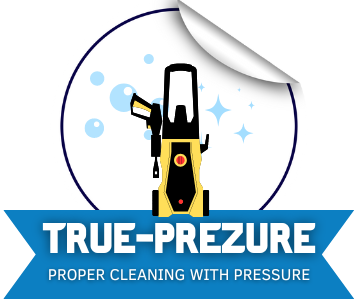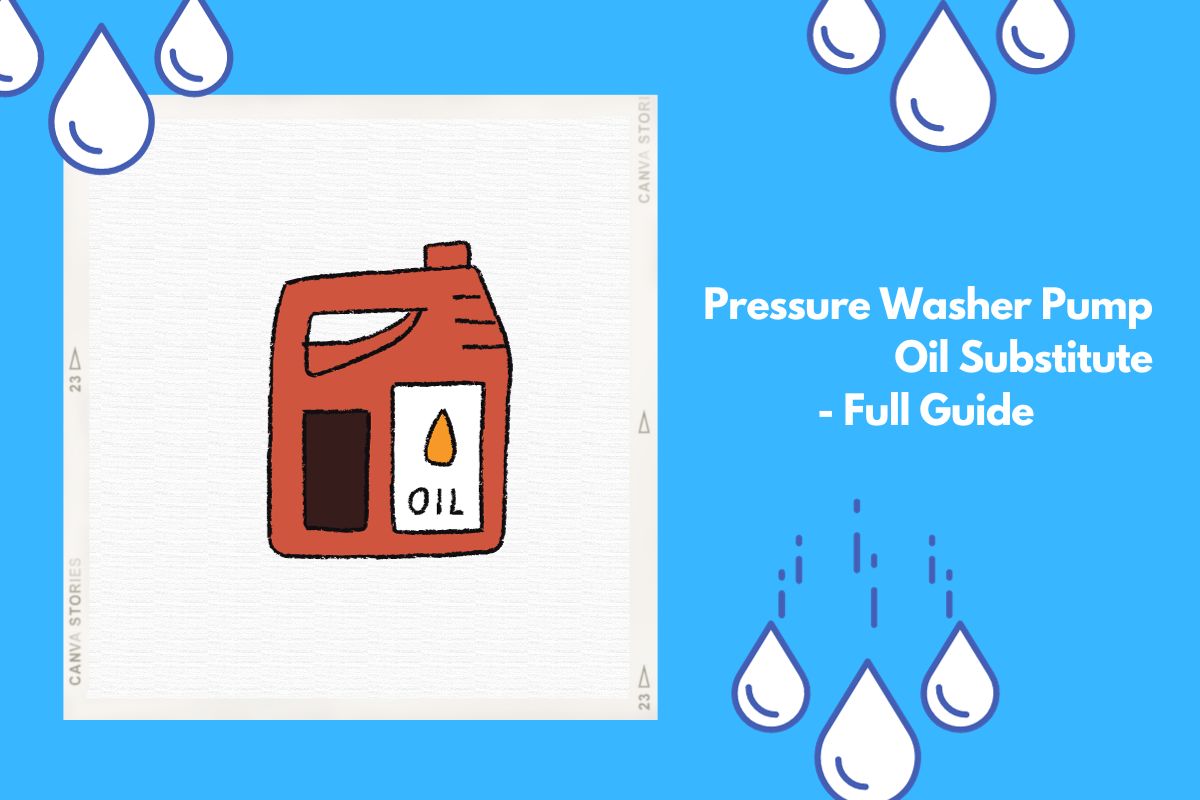Are you tired of constantly buying expensive pressure washer pump oil for your pressure washer?
Or maybe you’re in a bind and need to find a substitute quickly?
Whatever the reason may be, we’ve got you covered! In this full guide, we’ll explore different types of pressure washer pump oil substitutes that are readily available and can save you money.
Plus, we’ll discuss easy steps to change the oil in your pressure washer pump and when it’s time for a replacement. Don’t let pricey pump oils hold you back from getting the job done – read on to discover an affordable solution!
Pressure Washer Pump Oil Substitute for Pressure Washer
Using a pressure washer pump oil substitute can be a cost-effective solution for those who frequently use their pressure washer. While it’s essential to always follow manufacturer guidelines, sometimes using an alternative type of oil is necessary.
One option for a substitute is all-purpose engine oil. This type of oil offers lubrication and protection for the pressure washer pump while also being affordable and easy to find at most automotive supply stores.
Another option is non-detergent oil, which lacks additives that can potentially clog or damage the pump over time. However, it may not offer as much protection against wear and tear as other types of oils.

Synthetic oil can provide superior performance with its advanced formula designed to withstand extreme temperatures and prevent oxidation. It is more expensive than other options but may be worth considering in certain situations.
When choosing a pressure washer pump oil substitute, always research your options thoroughly before making any changes to your equipment. Consult with professionals if you have any doubts or concerns about compatibility or effectiveness.
All-Purpose Engine Oil
All-Purpose Engine Oil is commonly used as a substitute for pressure washer pump oil. It is an affordable and readily available option, which makes it a popular choice among DIY enthusiasts. However, it’s essential to note that not all engine oils are suitable for use in pressure washer pumps.
When choosing an all-purpose engine oil, be sure to look for one that meets the manufacturer’s specifications for your particular pressure washer model. Using the wrong type of oil or one with incorrect viscosity can cause damage to the pump and reduce its lifespan.
Another thing to consider when using all-purpose engine oils is their detergent content. Detergent oils contain additives that help prevent deposits from forming inside engines but can wreak havoc on pressure washer pumps by clogging up their valves and reducing overall performance.
If you choose carefully and use only high-quality all-purpose engine oils designed specifically for pressure washers, they can provide effective protection against wear and tear on your machine’s moving parts while keeping everything running smoothly without breaking the bank.
Non-detergent Oil
Non-detergent oil is another option for pressure washer pump oil substitute. This type of oil lacks the detergents that are commonly found in engine oils, making it less likely to leave deposits on your pressure washer’s pump.
One advantage of using non-detergent oil is its ability to provide better lubrication and protection to the internal parts of your machine. It also has a longer lifespan compared to regular engine oils because it doesn’t break down as easily.
When choosing non-detergent oil, make sure you select one that meets the viscosity requirements specified by your pressure washer manufacturer. Using an incorrect viscosity can cause damage or decrease performance.
Although non-detergent oil offers many benefits, it’s not suitable for all types of engines. For example, if you have a newer machine with advanced technology or high-performance components like turbochargers, superchargers or variable valve timing systems – these require specific types of engine oils.
Before deciding on using non-detergent oil as a substitute for pressure washer pump oil, always check with the manufacturer’s guidelines and recommendations to ensure proper operation and longevity of your equipment.
Synthetic Oil
Synthetic oil is a type of pressure washer pump oil substitute that has gained popularity among users in recent years. It is made using specially formulated chemical compounds, which means it offers various benefits over traditional engine oils.
One advantage of synthetic oil is its superior performance in extreme temperatures. Unlike regular oils, synthetic ones do not thin out too much when exposed to high heat or become too thick during cold weather conditions.
Another benefit of using synthetic oil as a pressure washer pump oil substitute is its longevity. Synthetic oils last longer than regular engine oils and are more resistant to breaking down under heavy loads or extended use.
Additionally, synthetic oils have fewer impurities compared to conventional engine oils due to their manufacturing process. This results in less sludge build-up inside the pump and better overall protection against wear and tear.
If you want the best possible performance from your pressure washer’s pump and increased durability with extended service intervals, consider switching to a premium-quality full-synthetic motor oil for your next maintenance routine.
Differences Between Engine Oil And Pump Oil
Engine oil and pump oil are two different types of oils that serve distinct functions. Engine oil is designed to lubricate the engine components, reducing friction between moving parts and protecting them from wear and tear. On the other hand, pump oil is formulated specifically for pressure washers’ pumps.
One significant difference between these two oils is their viscosity rating. Pump oil typically has a higher viscosity rating than engine oil because it needs to withstand high temperatures and pressures generated by the pump’s operation.
Another distinguishing factor is their detergent content. Most engine oils contain detergents that help keep the engine clean by preventing dirt buildup in the system, while most pump oils do not.
Additives included in each of these oils differ significantly based on function. For instance, rust inhibitors are more prevalent in pressure washer pump oil because water exposure causes metal gears to corrode easily.
Understanding these differences can help you choose an appropriate substitute when necessary or ensure you use the right type of oil during regular maintenance changes without damaging your equipment’s performance or lifespan.
Easy Steps to Change Pressure Washer Pump Oil for Pressure Washer
Changing the oil in your pressure washer pump is one of the easiest and most important things you can do to keep it running smoothly. Here are some easy steps to follow:
First, make sure your pressure washer is turned off and cool before starting any maintenance on it. Next, locate the oil cap or dipstick on your pressure washer pump. You may also need a drain pan handy if there isn’t an oil drain plug.
Once you have everything ready, remove the cap or dipstick and use a funnel to pour out all of the old oil into your drain pan. Make sure to dispose of this properly according to local regulations.
Now it’s time to add new oil. Check your owner’s manual for specific instructions on what type of oil should be used in your pressure washer pump. Use a funnel again to carefully add new oil until it reaches the appropriate level indicated by either markings on dipsticks or sight glasses.
Replace the cap or dipstick securely back onto its place when finished with adding fresh engine oils.
By following these simple steps regularly as specified by manufacturer recommendations will help ensure that your pressure washer pumps continue performing at their best for years without requiring unnecessary repairs due solely due negligence toward maintenance procedures!
When To Replace Pressure Washer Pump Oil for Pressure Washers
Regular maintenance of your pressure washer pump oil is crucial to ensure that it functions properly. As a general rule, you should change the oil in your pressure washer pump after every 50 hours of use or at least once a year, whichever comes first.
However, if you have been using your pressure washer frequently or under heavy loads, then it’s advisable to check the condition of the oil regularly. If you notice any signs of contamination such as water droplets or metal shavings in the oil, it may be time for an immediate replacement.
Another thing to keep in mind is that different types of pumps require different types and amounts of oil. So before changing your pressure washer pump oil, always read its instruction manual thoroughly to ascertain which type and amount are recommended.
In addition to this, if you’re not sure about how old or contaminated your current pump oil is, consider replacing it with fresh and clean new one before starting any projects. This can help extend the life span of both your machine and its components while ensuring maximum performance during operation.
Regular checks on the condition and age of the pressure washer pump oil will save money on repair costs while ensuring optimal performance from your equipment!
Conclusion
After exploring the different substitutes for pressure washer pump oil, it is clear that there are several options available. All-purpose engine oil, non-detergent oil, and synthetic oil can all be used as a substitute for pressure washer pump oil.
It’s important to remember that engine oils and pump oils have different properties, so using an incorrect type of oil could damage your equipment. Always check the manufacturer’s recommendations before making any substitutions.
When changing the pump oil in your pressure washer, make sure to follow the proper steps outlined in your owner’s manual. This will help ensure that you do not cause any damage or void any warranties.
FAQ
Can you use regular oil in pressure washer pump?
One of the most common questions about pressure washer pump oil is whether or not regular engine oil can be used as a substitute. The answer to this question is not straightforward and depends on several factors.
First, it’s important to understand that pressure washer pumps operate at much higher pressures and temperatures than car engines. Therefore, using regular engine oil may not provide adequate protection for the pump components.
Additionally, many pressure washers require non-detergent oils specifically designed for their pumps. These oils have additives that help prevent foaming and provide better lubrication under high-pressure conditions.
Using regular engine oil in your pressure washer pump could also void your warranty and lead to costly repairs down the line.
In summary, while you may be tempted to use regular engine oil as a substitute for pressure washer pump oil, it’s generally best to stick with manufacturer-recommended options. Doing so will ensure optimal performance and longevity of your equipment.
Can I use 5W30 in my pressure washer pump?
When it comes to selecting the right oil for your pressure washer pump, you may wonder if 5W30 is a suitable option. While some people think that this type of oil can work in a pinch, it’s not recommended by manufacturers.
First and foremost, it’s important to understand that pressure washer pumps require a specific type of oil with particular viscosity and anti-wear properties. Using the wrong type of oil can lead to premature wear and tear on the pump’s components.
Although 5W30 engine oil might seem like an acceptable alternative due to its relatively low viscosity rating, this kind of lubricant contains additives designed for automobile engines rather than pressure washers. These additives can cause foaming or other damage over time.
In addition, because pressure washers operate under high-pressure conditions and are often used for long periods without stopping, they generate more heat than passenger car engines do. This means that using 5W30 could result in overheating issues as well as potential clogs within the system.
It’s best to stick with manufacturer-recommended oils when servicing your pressure washer pump. While using 5W30 may seem like a quick fix at first glance, doing so could ultimately cause more harm than good in the long run.
What happens if you use detergent oil in pressure washer pump?
Using detergent oil in a pressure washer pump can cause damage and lead to costly repairs. Detergent oils are designed to remove dirt and grime from engine parts, but they can also break down the seals and o-rings in your pressure washer pump.
When these seals and o-rings break down, oil leaks can occur, which not only reduces the efficiency of your pressure washer but also creates a mess on your surfaces. In addition, using a detergent oil may void the warranty of your pressure washer as it is not recommended by most manufacturers.
Therefore, it’s important to always use the right type of oil for your pressure washer pump. By following this guide and understanding the different types of oils available, you’ll be able to keep your machine running smoothly for years to come. So take care of your investment by choosing the correct oil substitute today!

